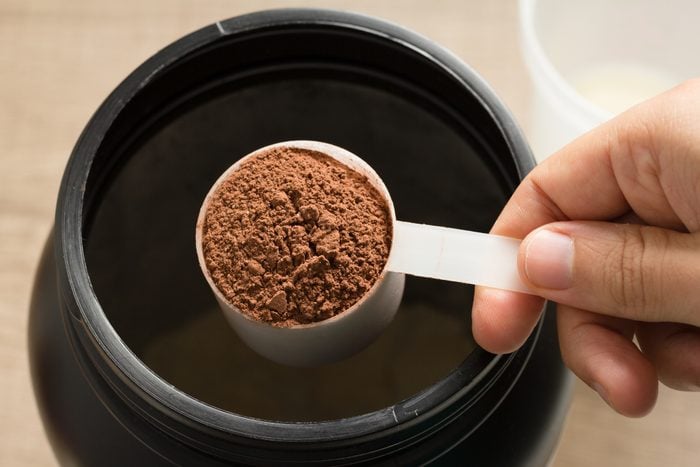
Protein power
Eating enough protein can sometimes be a challenge if you’re vegan or eating a primarily plant-based diet. The Recommended Dietary Allowance for protein for a healthy adult who doesn’t get a lot of exercise is currently 0.8 grams of protein per kilogram (2.2 pounds) of body weight per day. For a 150 pound adult that’s about 55 grams of protein per day. However, protein needs increase based on the type and amount of physical activity you perform, as well as your age. According to 2018 research published in the journal Nutrients, people 65 and older should get 1 to 1.2 grams of protein per kilogram is recommended. Serious athletes who follow a vegan diet may need as much as 2 grams per kg each day.
Protein is a part of every cell in the human body. This key macronutrient is needed to maintain, build, and repair tissues, including muscle, bones, skin, and even immune cells. Failing to get enough protein in your diet can lead to low energy, loss of muscle mass, diminished hair and skin quality, poor digestive health, hunger, weakened immunity, and increased injury risk.
Vegans can get enough protein
Fortunately a well balanced vegan diet can adequately meet your daily protein needs, and even support healthy weight management. A 2018 study published in the journal Nutrition & Diabetes, randomly assigned overweight adults to either a plant-based diet or standard diet for 16 weeks. Researchers found that the vegan diet was superior for improving body weight, reducing body fat, and improving insulin resistance markers.
However, vegan foods vary widely in their protein content. One cup of cooked quinoa provides 8 grams of protein, one ounce of almonds 5 grams, and a half cup of cooked black beans about 7 grams. In contrast, a quarter cup serving of a plant protein powder can easily provide 20-25 grams of protein, an amount on par with a 3-ounce skinless chicken breast.
That means a relatively small portion of plant protein powder can supply a generous chunk of a vegan’s daily protein requirement, and serve as a complement to the protein provided by whole plant foods, including produce, pulses, whole grains, nuts, and seeds. Check out these nutritionist-approved vegan protein bars that also do the trick.
Read the labels
But, not all plant protein powders are formulated the same way. As a registered dietitian, I’m pretty picky about the quality of the powders I use and recommend. To select the best options I use two rules of thumb:
- First: Look for a product made with simple, easily recognizable ingredients. The ingredient list should be the first thing you look at when reviewing brands online or at your local market. Some of my favorite choices are simply one type of isolated plant protein and nothing further.
- Second: Opt for plain, unflavored, unsweetened powders. This will allow you to add your own sweetener if needed—and control how much you use—and flavor the powder yourself with all-natural add-ins, like raw cocoa powder, spices, organic zest, and herbs.
Plain powders also offer more versatility because they can be used in a wide range of recipes. And buying unsweetened powder eliminates ingredients like man-made artificial sweeteners, including aspartame and sucralose, and highly intense sugar substitutes, like stevia or monk fruit (luo han guo); according to the Food and Drug Administration (FDA), they’re about 200 times sweeter than natural sugar. The latter two aren’t well studied in my opinion, and 2016 research published in the journal Cell Metabolism shows that artificial sweeteners may affect appetite regulation; other findings suggest they may be linked to an increased risk of metabolic diseases.
Here are eight plant protein options that meet my simple criteria. I’ve included nutrition facts, unique qualities they offer, as well as suggestions for easy ways to use powders to bolster your daily protein intake.
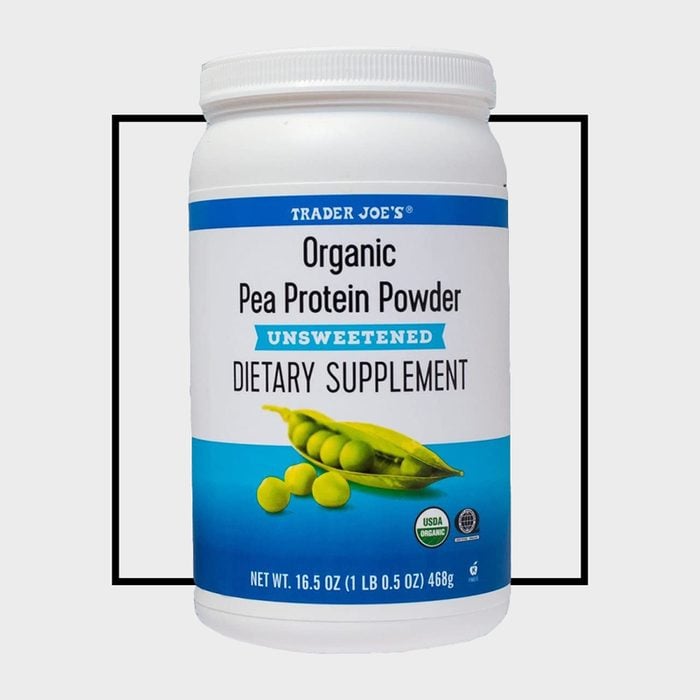
Trader Joe’s Organic Pea Protein
$34
The only ingredient in this canister is organic pea protein isolate. One portion provides 20 grams of protein, 1 gram of carbohydrate, and 2 grams of fat. One advantage of pea protein for active vegans is its leucine content, an amino acid that triggers muscle building. A study published in 2019 in the journal Sports found that pea protein generated results that could match whey protein in measures of muscle strength, performance, body composition, and muscular adaptations following eight weeks of high-intensity training.
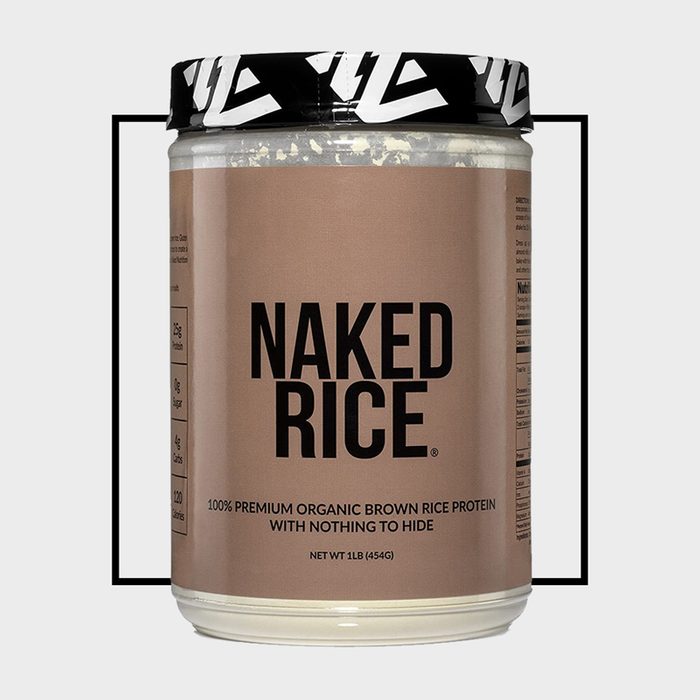
Naked Rice
$22
A single ingredient powder, this one contains only organic sprouted whole grain brown rice protein. One portion provides 25 grams of protein, 4 grams of carbohydrate with 1 gram of fiber (3 grams of net carbs), and 0.5 grams of fat. Like pea protein, rice protein isn’t a common trigger of allergies and food sensitivities. And a 2013 study found that compared to whey protein, rice protein matched outcomes for exercise performance, post-exercise muscle soreness, and body composition among men who engaged in strength-training sessions.
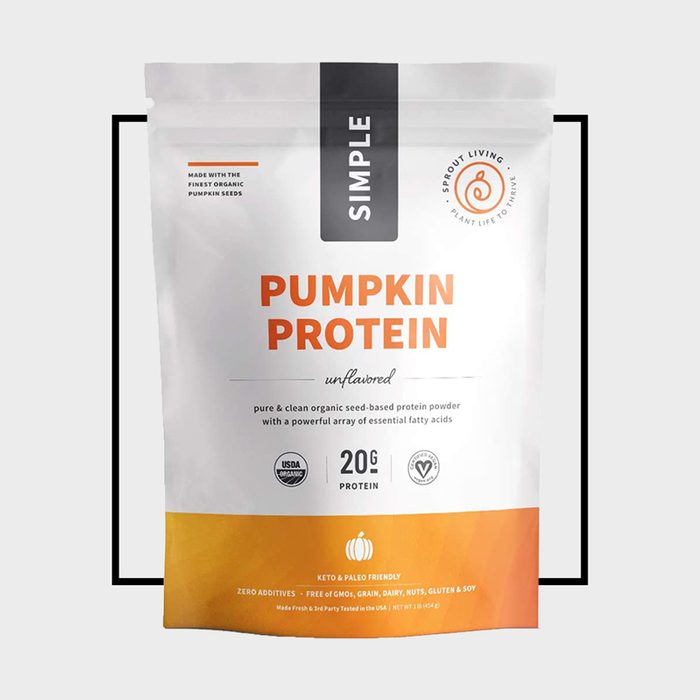
Sprout Living Simple Pumpkin Seed Protein Powder
$24
Pumpkin seed protein is a relative newcomer to the plant protein space. In this product, the only ingredient is organic cold-pressed pumpkin seed protein. One portion provides 20 grams of protein, 4 grams of carbohydrate with 3 grams of fiber (1 gram of net carbs), and 3 grams of fat. Pumpkin seeds are a great option for vegans who enjoy a nutty flavor but can’t consume nuts.
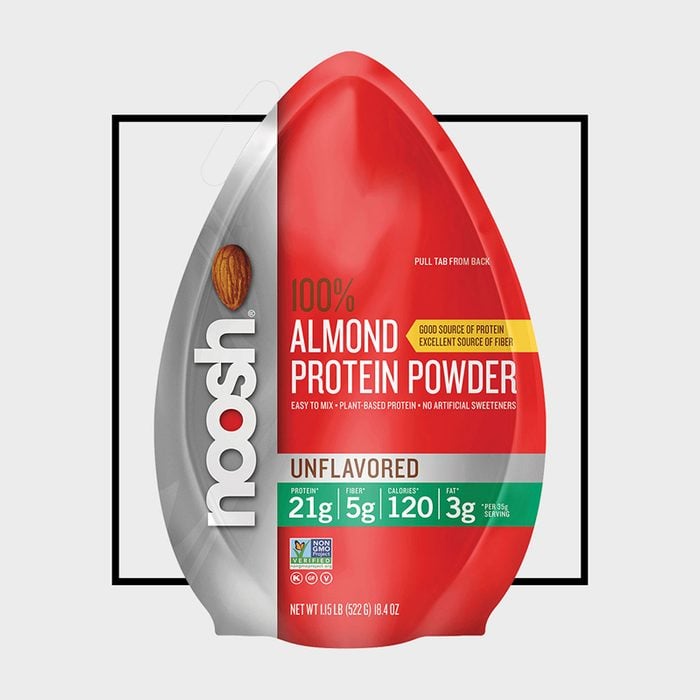
Noosh
$30
This powder is made from California-grown almond protein. One portion contains 21 grams of protein, 8 grams of carbohydrate with 5 grams of fiber (3 g net carbs), and 3 grams of fat. This is the highest-fiber product in the bunch, with nearly 18 percent of the minimum daily target. Its surprisingly powdery texture also blends well in a wide variety of recipes.
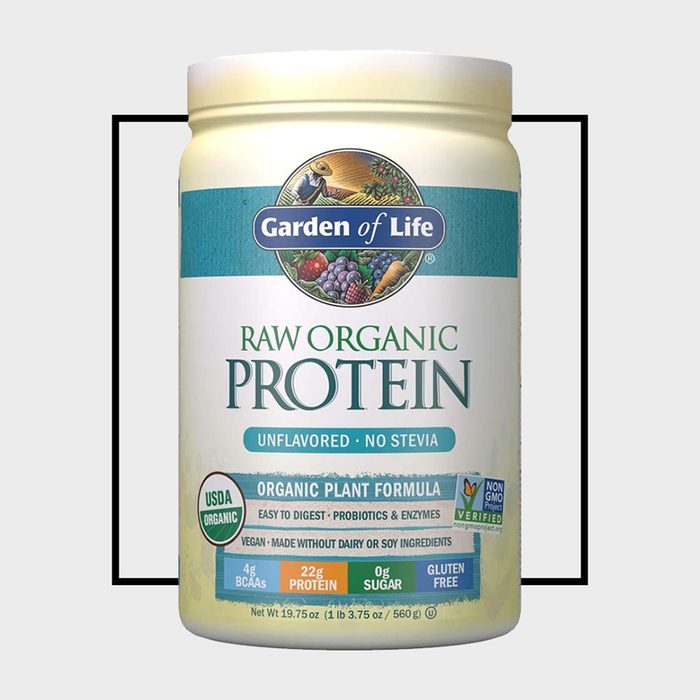
Garden of Life Raw Organic Protein
$33
This product is made from a broad range of plant ingredients, including organic pea, sprouted brown rice, amaranth, quinoa, buckwheat, millet, chia seeds, chickpeas, lentils, and more. It also contains plant enzymes as well as probiotics. One portion provides 22 grams of protein, 2 grams of carbohydrate with 1 gram of fiber (1 gram of net carb), and 2.5 grams of fat. It’s also gluten-free and Non-GMO Project Verified.
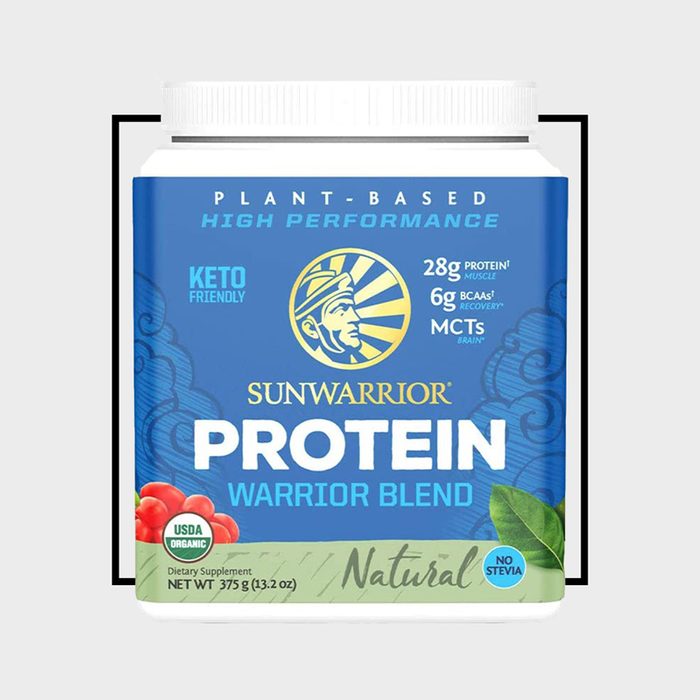
Sun Warrior Protein Warrior Blend
$21
This product contains a propriety blend of organic fermented pea, hemp, and goji berry proteins, and organic coconut-derived medium-chain triglyceride (MCT) oil. There’s buzz around MCT oil because the shorter chain length means it’s a bit easier to digest—and it may help suppress appetite, among other potential benefits. One serving provides 19 grams of protein, 1 gram of carbohydrate with 1 gram of fiber (0 net carbs), and 2 grams of fat. While the fat content is relatively low, some research from 2016 in the journal Nutrients shows that MCT oil may help boost calorie burn, weight loss, and metabolic health.
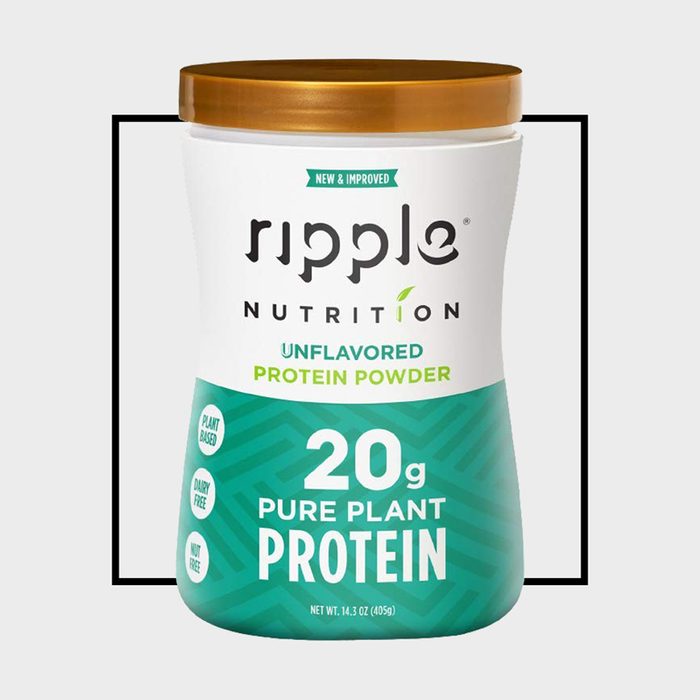
Ripple
$24
Vegans may be familiar with Ripple’s pea milk and plant-based “ice cream.” This protein powder does contain plant-derived gums, which are generally added as thickeners or stabilizers or to improve texture. Otherwise, it’s made from pea protein and natural flavors, but no sweeteners. One portion contains 20 grams of protein, 2 grams of carbohydrate with 1 gram as fiber (1 gram net carb), and 1.5 grams of fat.
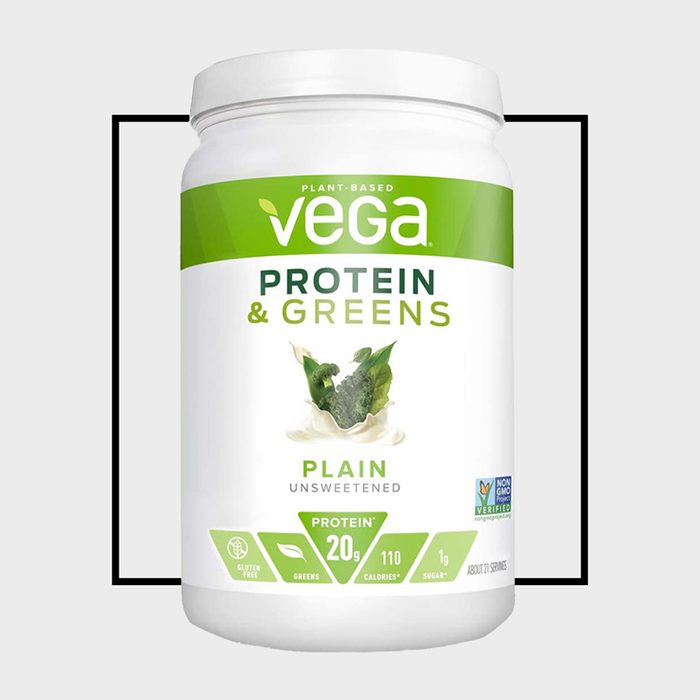
Vega Protein & Greens
$30.00
Vega is a well-established plant-based brand and I appreciate that they offer an unsweetened protein powder option. One serving provides 20 grams of protein, 3 grams of carbohydrate with 1 g fiber (2 grams net carb), and 2.5 grams of fat. While it does contain extra ingredients such as the thickener xanthan gum, the powder’s main ingredients are pea protein, brown rice protein, and powdered vegetables, including kale, alfalfa, and broccoli, in addition to sacha inchi, a seed native to Peru, Ecuador, and Columbia that is rich in healthy omega-3 fats. It’s difficult to quantify exactly how much veggies you get per serving, but some people like the bonus of extra built-in greens.
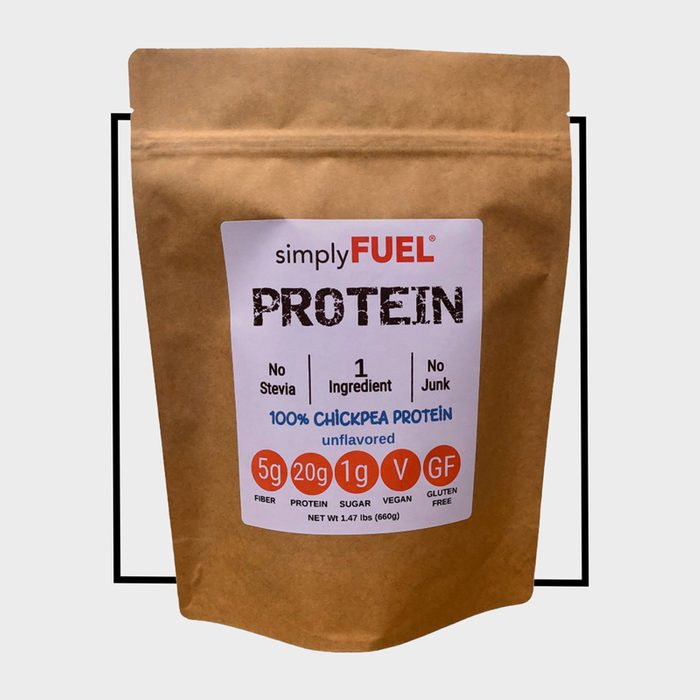
SimplyFuel Protein
$40

Ways to use protein powders
Smoothies are one of the easiest ways to incorporate plant protein powder into a daily routine, but they’re not your only option. Vegans can use plant powders in both sweet and savory dishes in a variety of ways. Add full or partial portions to pancakes, oatmeal and overnight oats, breakfast cookies, bars, and other baked goods. For lunch or dinner incorporate protein powder into blended plant soups, hummus, plant burger patties, and pizza crust. For snacks, try protein-bolstered energy balls made with nut butter and add-ins like oats, dried fruit, and spices.
You can even boost the protein content in desserts, including chia pudding, mock ice cream, or frozen pops, and treats like brownies and homemade peanut butter cups. The goal isn’t to add protein to everything you eat, and your main focus should be obtaining protein from whole plant foods. But, a vegan powder is one of the simplest ways to fill a potential protein gap.
